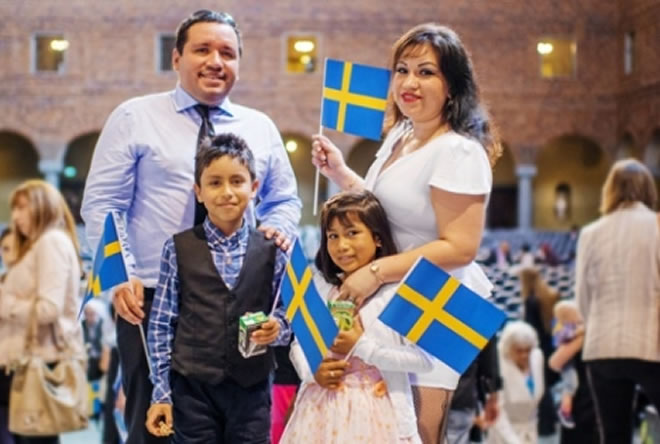Sweden is grappling with how to handle a large influx of asylum seekers while some other EU nations brush off responsibility – but it's important to focus on the benefits of immigration as well, high-profile panelists agreed at an Almedalen event.

Photo: Simon Paulin/imagebank.sweden.se

Monday, July 6, 2015
Just in 2014, the number of conflicts in the world rose by 18 percent. The number of displaced people is higher than it has been since World War II. More than 60 million people have become refugees or internally displaced.
How can the EU handle the increased migration caused by conflict?
It's a question on the lips of voters, politicians, and non-profit organisations alike, yet answers remain evasive.
The EU Commission in Sweden put the spotlight on the migration crisis at Almedalen this week, with Migration Minister Morgan Johansson onstage at Europahuset.
Only 600,000 refugees have come to the EU. It may sound like a lot, but how many people live in the EU? Something like 500 million. That's like one refugee per year being granted asylum to an island of 1,000 people.”
Johansson said that the so-called migration crisis is not an issue of numbers, but rather of shared responsibility.
“All EU countries need to share responsibility. Certain countries offer asylum to 3,000 people in two years, while Sweden accepts 3,000 refugees in two weeks.”
EU Member of Parliament Cecilia Wikström also participated, along with Director of the Swedish International Development Cooperation Agency (SIDA) Charlotte Petri Gornitzka and Katarina Areskoug Mascarenhas, head of the European Commission in Sweden.
Wikström agreed with Morgan Johansson's assessment of the situation.
“Last year Sweden took in as many refugees as Germany, did – tens of thousands. But Estonia only granted asylum to ten people,” she informed the audience.
While the EU is a strong union in some regards, Wikström said that the lack of cooperation when it comes to granting asylum is proof that the region is not as unified as it may seem.
“We must see European solidarity as something that actually means something,” she explained.
“We talk about burden sharing, but people are not burdens, they are people.”
Of the Syrian refugees who have made the journey to the EU, one of three has higher education, Wikström said. It's an asset which EU countries sometimes ignore – a huge mistake.
“Today there are four working citizens for every pensioner, but in just a few years it will be only two-to-one,” she said. ”We need an influx of people. If Sweden takes in as many refugees as we can handle right now, we will be more prepared for the future.”
The Migration Minister agreed, noting that it's critical to include the benefits of migration in any discourse on the issue, rather than focusing solely on the challenges.
“The Västra Götaland region of Sweden was recently in need of 100 doctors,” he said.
“And when they turned to the refugee population, they discovered they had 31 Syrian doctors already living there.”
Rather than needing to wait for Swedes to finish costly and lengthy education procedures, the region offered courses in Swedish medicine terminology for the doctors, who were quickly able to gain Swedish practitioner licenses and begin working.
”We are all so proud of Zlatan, and we have to remember that those who come here now may give us the Zlatan and Loreen of 2030,” Johansson remarked.
In addition to sharing the responsibility for refugees, EU nations must work on making it easier to legally reach the EU and work there, the panellists agreed.
For one, smugglers must be stopped from taking advantage of desperate people, Wikström said.
”People pay thousands of dollars to risk their lives on an illegal boat,” she said. ”We cannot take away the business model of the smugglers without offering a legal alternative for these people.”
Johansson said that the Swedish government also supports creating additional legal ways of entering the country – although each city within Sweden must also share responsibility, and the housing market needs to catch up.
”It's also very important that those who are able to come to Sweden on work permits, for example, have good working conditions,” he said. ”They should get what they are promised, not have to negotiate for 30 kronor an hour when they actually get here.”
While there is still much work to be done before the EU has a functioning system for sharing refugee responsibility, the pros are just as important as the cons, the panel concluded.
”The refugees who come here today may be our future doctors, political scientists, and singers,” Johansson said. "We need to keep that perspective."